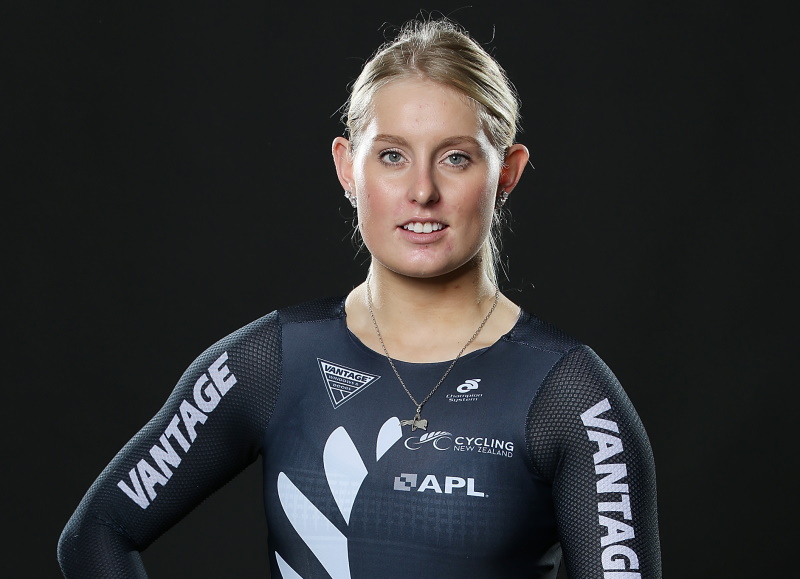
This story discusses mental health and suicide. A list of helplines is available at the bottom of the page.
Olivia Podmore was never referred for a detailed psychological assessment after she scored poorly on a mood test that indicated she found life meaningless and did not believe in her own self-worth.
The elite cyclist was 24 years old when she died by suspected suicide in August 2021, the day after the end of the Tokyo Olympics, which she was not selected for.
Podmore's scores were the worst seen by a health practitioner and he raised concerns with another health practitioner Podmore was seeing.
Neither of the practitioners can be named and their specific roles cannot be identified while the case is being heard at an inquest before Coroner Louella Dunn.
However, the first health practitioner told the Coroner's Court in Hamilton the scores in February 2020 were worrying.
"Those are really concerning scores. I was really concerned and I discussed that with Olivia."
The witness said Podmore already had an appointment with the other practitioner and he was relying on him to provide the correct treatment or referral.
But the counsel for the coroner, Joshua Shaw, asked whether a detailed psychological assessment was done as recommended for such a score.
The practitioner said he was relying on the other one, with his particular skill-set, to guide him on that.
But the advice to the witness was that the test was simply a screening tool, not a diagnostic one, and that it was better to have a one-on-one assessment with the athlete.
The inquest heard Podmore had seen another practitioner who was not a psychiatrist or psychologist.
In January 2021, Podmore reported having a very low mood for two weeks.
She told the practitioner she felt flat, both physically and mentally since endometriosis surgery in October 2020 and that she sometimes wondered if she would be better off dead.
"She said she had fleeting thoughts along the lines of 'life is tough and I would be better off dead'," he wrote in his evidence.
"I was very concerned obviously. That's the first time she'd presented with any thoughts of self-harm or suicide, and that's a very serious thing to say."
He queried whether she had made any plans or searched methods, which she had not, and discussed a safety plan including who to call if she had the thoughts again.
He assessed her risk of suicide as low and contacted the other practitioner who Podmore was comfortable with, and said he relied on him to take the lead.
When the practitioner left the job his written handover did not include any reference to the suicidal ideation and he could not remember why.
He thought it might have been because Podmore had been extra sensitive about what was written in her health notes after some private medical information including relating to her mental health challenges had previously been leaked among coaches and team-mates in the Cycling New Zealand programme at Cambridge.
Podmore had been the target of ongoing bullying after inadvertently exposing an affair between a coach and team-mate at a training camp in Bordeaux ahead of the 2016 Rio Olympics.
The practitioner said earlier in his testimony that Podmore would check his written notes and they used "low mood" to reference mental health as she did not want her health to be used against her if it was read by other staff.
The practitioner said he did not know exactly who had access but potentially any health staff within the velodrome could have.
Shaw asked the practitioner whether he clarified who had access, but he did not.
The inquest also heard Podmore was struggling with fatigue, was taking methotrexate for psoriasis as well as antidepressants but wanted to come off the medications and did at various stages.
She had also undergone surgery for endometriosis in October 2020 and endured another crash.
The practitioner said Podmore put significant pressure on herself to succeed and not being nominated for selection to the Tokyo Olympics affected her along with the Bordeaux incident, a review by Mike Heron KC into allegations of bullying at Cycling New Zealand in 2018 and family-related stress.
Before he left the job in 2021 the practitioner arranged funding for Podmore to receive further external therapy for her mental health.
Some time after he left Podmore messaged him on WhatsApp saying she was still struggling a lot and her thoughts were bad.
"She asked about funding to go and see someone external. I replied saying that I would follow up for her."
The practitioner contacted the second practitioner 11 days later to relay the message and remind him of the funding for the external practitioner.
"He responded, thanking me for sending it to him. I didn't hear anything further."
Where to get help:
Need to Talk? Free call or text 1737 any time to speak to a trained counsellor, for any reason.
Lifeline: 0800 543 354 or text HELP to 4357
Suicide Crisis Helpline: 0508 828 865 / 0508 TAUTOKO (24/7). This is a service for people who may be thinking about suicide, or those who are concerned about family or friends.
Depression Helpline: 0800 111 757 (24/7) or text 4202
Samaritans: 0800 726 666 (24/7)
Youthline: 0800 376 633 (24/7) or free text 234 or email talk@youthline.co.nz
What's Up: free counselling for 5 to 19 years old, online chat 11am-10.30pm 7days/week or free phone 0800 WHATSUP / 0800 9428 787 11am-11pm
Asian Family Services: 0800 862 342 Monday to Friday 9am to 8pm or text 832 Monday to Friday 9am - 5pm. Languages spoken: Mandarin, Cantonese, Korean, Vietnamese, Thai, Japanese, Hindi, Gujarati, Marathi and English.
Rural Support Trust Helpline: 0800 787 254
Healthline: 0800 611 116
Rainbow Youth: (09) 376 4155
OUTLine: 0800 688 5463 (6pm-9pm)
If it is an emergency and you feel like you or someone else is at risk, call 111.













